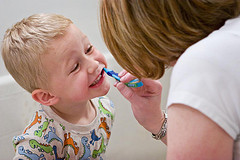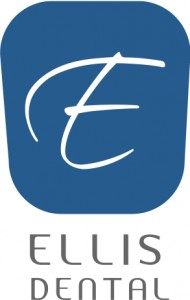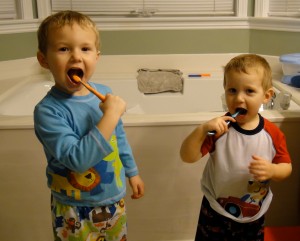8 Ways to Keep Your Mouth Healthy
Dr. Ellis Joins 102.5 KEZK to Discuss Oral Health and How to Choose the Right Brush
Dr. Ellis on FOX2 Talking About National Toothbrush Day!
Children's Dental Health Month
Morning Breath Explained
Does Coffee Really Erode Tooth Enamel?
Many leading oral hygiene manufacturers are now producing toothpastes which they market as being able to protect against enamel loss. That sounds like a pretty bold statement. Can these toothpastes really reverse or stop the damage? Tooth erosion generally occurs over a fairly long period of time unless there is an accident or injury that cracks the tooth. Many times erosion happens due to involuntary clenching or grinding of the teeth while sleeping and is often not detected until the enamel is badly damaged.
Deteriorating enamel is also caused by what we eat and drink. Certain foods and liquids leave an acid based plaque coating on the teeth. Then as we age and our saliva production decreases it becomes harder for these acids to be washed away. Red wine, coffee and tea are all liquids which both stain and weaken tooth enamel. Citrus drinks, such as orange juice, sodas; both diet and regular and some even sports drinks can easily cause erosion problems along with foods with a high sugar and starch content.
Research has determined those new enamel strengthening toothpastes can be beneficial but don’t actually rebuild the enamel in as much as they make the tooth’s surface more resilient. But it is important to remember just using a special toothpaste isn’t going to save your enamel. Limit consumption of acidic beverages and eat a balanced diet with plenty of fruits and vegetables, especially apples, celery and carrots. These fibrous foods help with salvia production and work to clean plaque off the teeth.
When selecting a toothpaste, scientists agree any well formulated fluoride toothpaste will help make your enamel more acid resistant. Always choose a major brand name since more research and development has gone into crafting the correct formulation. Then also select a paste with a pleasing taste. If it doesn’t taste good, you won’t be as eager to brush for the prescribed two minutes twice a day.
Concerned about the condition of your enamel? Please schedule an appointment with Ellis Dental today.
Photo Credit
How a Parent’s Dental Health can Affect Their Children
 Growing up you probably heard your parents say, “Do as I say, not as I do” and swore when you had kids you would never repeat that same sentence. Now as you drink sugary sodas, eat chewy sticky candy and keep putting off that long neglected dental appointment, you hear those same words coming out of your mouth. As a parent it is important to teach your child good oral health beginning at an early age. But as we all know, children learn through example. If they don’t see you taking care of your teeth along with getting regular dental exams, chances are pretty good they won’t understand just how important good dental health really is.
Studies have shown definite correlation between the frequency of tooth brushing in a parent and the same degree of frequency of tooth brushing in their children. Research has also determined both oral hygiene skills and a parent’s attitude toward oral hygiene play a major role in a child accepting brushing and flossing as part of their daily routine.
Growing up you probably heard your parents say, “Do as I say, not as I do” and swore when you had kids you would never repeat that same sentence. Now as you drink sugary sodas, eat chewy sticky candy and keep putting off that long neglected dental appointment, you hear those same words coming out of your mouth. As a parent it is important to teach your child good oral health beginning at an early age. But as we all know, children learn through example. If they don’t see you taking care of your teeth along with getting regular dental exams, chances are pretty good they won’t understand just how important good dental health really is.
Studies have shown definite correlation between the frequency of tooth brushing in a parent and the same degree of frequency of tooth brushing in their children. Research has also determined both oral hygiene skills and a parent’s attitude toward oral hygiene play a major role in a child accepting brushing and flossing as part of their daily routine.
Often because of wide array of socioeconomic reasons, including not being taught proper dental care when they themselves were children, cost of dental procedures, lack of dental insurance and not understanding the importance of primary teeth, new parents have to be educated on how to care for their child’s teeth. Today, many pediatricians have begun teaching parents on how tooth decay can affect their child’s overall general health. They also are strongly suggesting a child have their first dental appointment between the ages of 12 to 18 months.
Ellis Dental accepts new patients of all ages and would be proud to be your child’s oral health care provider, they even offer well baby exams at no charge for all children under the age of 2. With two small children of her own, Dr. Ellis understands completely the challenges parents can face when it comes to teaching their children proper dental care. Please call us today at 314.965.1334 for more information or to schedule an appointment.
Photo Credit
What is Tooth Enamel and How to Protect It
 Many of our posts mention tooth enamel but we’ve never really discussed in detail exactly what tooth enamel is and the best way to care for it.
Tooth enamel is the hardest substance in your mouth. When you look at a tooth, the enamel is what you are seeing; it covers the entire outer layer of the tooth. Enamel is primarily made up of hydroxyapatite. This is a natural calcium mineral generally found in both tooth enamel and bone. This mineral compound is semi-translucent and can vary in shades from pale yellow, grayish white and off white. Because of its translucency, tooth color is only partially based on the enamel shade.
Many of our posts mention tooth enamel but we’ve never really discussed in detail exactly what tooth enamel is and the best way to care for it.
Tooth enamel is the hardest substance in your mouth. When you look at a tooth, the enamel is what you are seeing; it covers the entire outer layer of the tooth. Enamel is primarily made up of hydroxyapatite. This is a natural calcium mineral generally found in both tooth enamel and bone. This mineral compound is semi-translucent and can vary in shades from pale yellow, grayish white and off white. Because of its translucency, tooth color is only partially based on the enamel shade.
There are no living cells in tooth enamel and it can’t regenerate like other body parts. When tooth enamel is destroyed, it can potentially cause serious problems. Enamel is the main barrier in guarding your teeth from decay. It also protects all the inner layers from damaging acids and the harmful effects of plaque. The enamel coating keeps your teeth from being damaged by foods and beverages which are too hot or cold.
Because enamel can be broken or dissolved off the tooth, it is important to follow these five tips to help keep your enamel strong.
- Brush or at least rinse after consuming acidic foods and beverages. Limit your sugar intake.
- Don’t chew ice and stop biting on non-food items such as the end of pens or your fingernails.
- When brushing make sure to use a soft brush head in order to not damage the enamel.
- If you grind your teeth, talk with your dentist about the advantages of a mouth guard.
Interested in learning more about your tooth enamel and how to protect it? Please schedule an appointment with Ellis Dental today.
Five Signs You Need to Visit the Dentist
 Most of the time seeing your dentist twice a year for a thorough cleaning and check-up is sufficient for heading off any problems. Though on occasion something comes up and you just aren’t sure if it warrants a dentist appointment. Or perhaps you’re one of those folks who haven’t seen a dentist in years but now are having problems. Not sure if it’s time to pick up the phone and call 314.965.1334 and schedule an appointment to come see Dr. Ellis? Keep reading.
Most of the time seeing your dentist twice a year for a thorough cleaning and check-up is sufficient for heading off any problems. Though on occasion something comes up and you just aren’t sure if it warrants a dentist appointment. Or perhaps you’re one of those folks who haven’t seen a dentist in years but now are having problems. Not sure if it’s time to pick up the phone and call 314.965.1334 and schedule an appointment to come see Dr. Ellis? Keep reading.
- If you are experiencing chronic tooth pain, it is definitely time to see a dentist. The pain could be caused by something as simple as a cavity or more serious periodontal disease.
- If your gums hurt, bleed or look red and swollen, then please make an appointment. Often, especially if you haven’t had a professional cleaning in a while, hardened plaque can become trapped under the gum line. Gingivitis or periodontal disease has the potential to cause tooth loss if not treated.
- One day after brushing you notice white spots on your teeth; those aren’t supposed to be there. White spots are one of the first indications of dental decay inside the tooth. When the enamel begins to dissolve due to a buildup of bacteria, the interior of the tooth becomes infected.
- Most of us get the occasional canker sore or mouth ulcer and that in itself isn’t cause to worry. That is unless you get a sore that doesn’t heal or they start occurring on a regular basis.
- If you have begun experiencing early morning headaches, it might be a good idea to schedule a dental appointment. Often grinding your teeth at night can cause pain in your head, jaw and face.
As always, if you are experiencing any other problems or concerns, Dr. Ellis and her caring staff is only a phone call away.
Five Ways to Protect Your Child’s Teeth
 Preventive dental care for your child is vitality important and neglecting their oral hygiene can have long-term damaging effects.
Preventive dental care for your child is vitality important and neglecting their oral hygiene can have long-term damaging effects.
- Even before that first tooth erupts it’s important to clean your child’s gums on a daily basis by using a soft cloth or a piece of gauze dipped in warm water and gently rubbing.
- Start brushing as soon as one tooth appears and begin to floss when your child has two teeth that touch each other. Brushing should be done twice a day but if that isn’t possible make sure your child always brushes before going to bed.
- Don’t put your child to bed with a bottle and once off the bottle, limit how frequently they use a sippy cup. Anything other than water can cause bacteria to grow which in turn causes the acid that creates tooth decay. Plus the constant pressure of a nipple or hard plastic spout can affect the “bite” or shape of the mouth.
- Introducing your child at a very early age to good nutrition will help with good dental health. Limit juice to mealtime or as a special treat and don’t just assume because a snack is suppose to be “healthy” that it isn’t damaging to your child’s teeth. Things like granola bars and dried fruit are sticky and can leave residue on the teeth.
- Pay attention to the medications your child is prescribed. Many have a sweet sugary base that lingers on teeth after the medication is taken. Make sure to have your child rinse their mouth or brush their teeth after dosing.
For more helpful tips on how to care for your child’s teeth or to schedule their first dental appointment, please contact Ellis Dental today.
Everything You Wanted to Know About Toothbrushes and More
We all use one, hopefully at least twice a day, but how much do you really know about that toothbrush hanging in your bathroom?
Manual or Power
Manual toothbrushes, if used correctly and for the prescribed amount of time, do a great job. That said, many people, especially children, prefer an electric or battery powered brush. Most power toothbrushes come with a built-in timer so you don’t have to worry if you are brushing long enough. Power brushes are also good for people with mobility concerns such as neurological problems or arthritis.
Bristles
Soft or extra soft bristles are always recommended because many times anything else is too harsh for sensitive gums. After you decide on bristle firmness it is vitally important to remember to change your manual toothbrush or the head on your power brush every three months, or sooner if the bristles begin to look frayed. Over time, with use, the bristles become flat making plaque removal difficult.
Toothbrush Maintenance
Just as you rinse your mouth one final time after brushing, it’s important to also rinse your toothbrush. This removes food particles, old toothpaste and mouth bacteria. Then make sure your toothbrush is allowed to thoroughly air dry between brushings. Don’t store your brush in a closed container as this can promote bacterial growth.
We here at Ellis Dental recommend power brushes to the majority of our patients and offer both Sonicare and Oral B for sale. We also have brush head refills, which make the perfect holiday stocking stuffer! Prices for both are less expensive than can be found at major retail stores. Along with good brushing and flossing habits, don’t forget to schedule bi-yearly dental checkup. Please call 314-965-1334 to make your appointment today.
Photo: Pinterest








